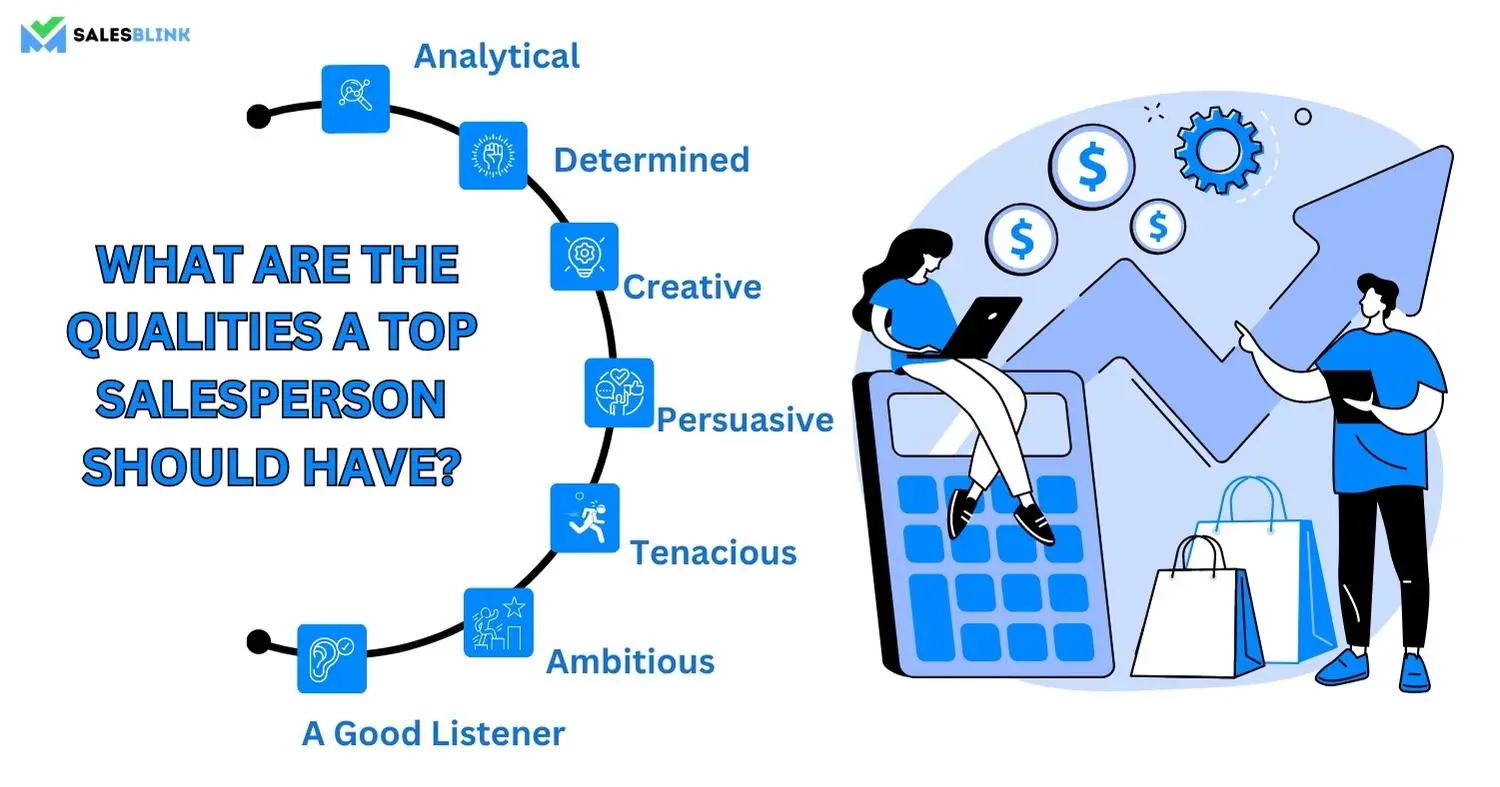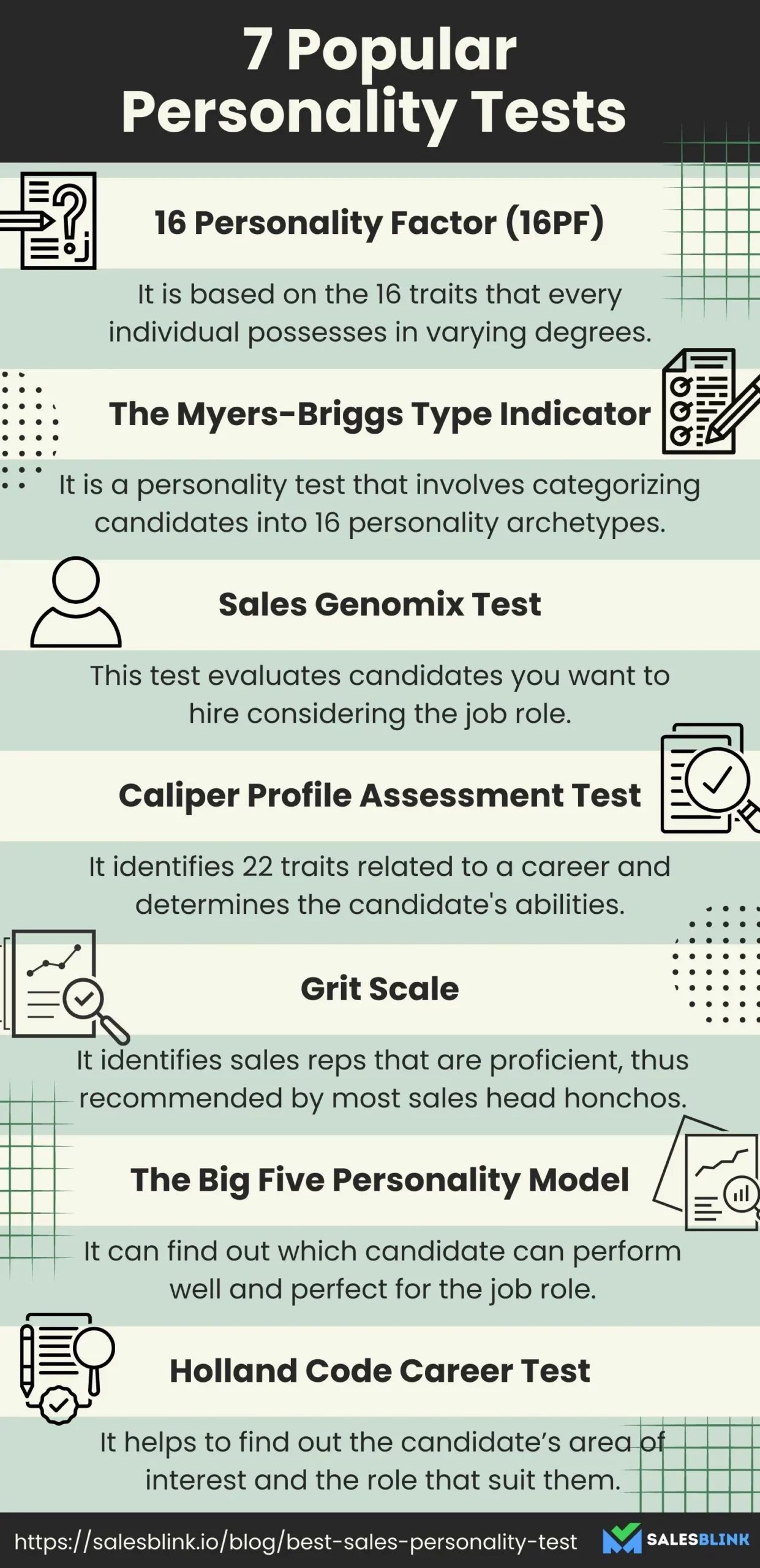Do you know that onboarding a sales rep costs the company 1.2 to 1.5 times their salary? You would obviously want it to be worth it, right? If you are heading a sales team, you would agree that finding sales reps fit like a glove in your organization is challenging. It is getting out of hand to hire suitable candidates resulting in settling down for not-so-experienced reps who don’t have an illustrious background. Hiring novices can hamper the bottom line of your business which is to generate maximum sales revenue.
Are you worried? You need not as there’s help at hand. This blog post finds the best sales personality tests to help you recruit the right candidates for your team. Look at the top 7 tests, types of test questions and how to interpret the score.
Table of Contents
What Are The Qualities A Top Salesperson Should Have?
Needless to say, the role of a salesperson is to drive as much business as possible for the company, and in doing so, they need to be able to demonstrate a number of qualities. Let’s take a look at how a top-notch salesperson should be,

Analytical
A salesperson needs to have the ability to analyze data. Being able to spot any opportunities that may arise within a company and turning them into sales is what characterizes a top performer. An analytical sales rep would be able to put the data into practice to get maximum results.
Determined
A salesperson who wants to succeed needs to be determined. In the face of fierce competition, a good salesperson needs to know how to deliver excellent results, and for that, there is the need for determination. Determined individuals believe in themselves and what they are doing, and this self-confidence leads to great sales results.
Creative
Apart from being determined, a top-performing salesperson needs to be creative. Such individuals can think of unique ways of accomplishing a goal. For the creative individual, dreaming up a campaign and coming up with novel ideas to make it successful are two facets of the job that can be extremely rewarding.
Ambitious
A top-notch salesperson must be ambitious. Being ambitious leads to great sales results because it drives one to want to succeed and excel at what the person does. Having higher ambitions will make reps achieve more, which works in favor of the company’s goal.
A Good Listener
Half of the battle is won if a sales rep is an active listener. Prospects like it when they get attention, and nothing beats their happiness when a rep actively listens to what they are saying. The quality of being a good listener can make the sales rep present solutions based on the needs of the prospect, which ultimately benefits the company.
Persuasive
Being persuasive is the ability to convince people to agree with you. It helps convince prospects to take the desired action, which is to take the sales conversation forward. While being persuasive, it is essential to listen to what someone has to say and respond with logic and information to it. Also, ensure that you don’t waste the prospect’s time. Time management for sales reps is crucial.
Tenacious
Last but not least, we have tenacity. This is the ability to keep going even when the odds are against you. When things start looking bleak, a tenacious salesperson will continue battling for their company even when they think they may fail. Being able to deal with adversity and stick to your guns is a trait that all top performers possess.
You can always read sales motivational quotes when you feel low.
Why Are Sales Assessment Tests Becoming More Popular?
As opposed to the old school sales assessment tests that were expensive and time-consuming, you have the new-age test that you can conduct online anytime and from anywhere without spending too much. These benefits are the main reason businesses these days want to hire salespeople with the help of an online sales assessment test.
Most recruiters conduct sales assessment tests at the beginning of the recruitment process to remove candidates who are not up to the mark right in the initial stages. This reduces the number of interviews and ensures that only qualified applicants reach the final phase. With the help of these tests, it is possible to find candidates that fit into the company’s definition of an ideal candidate.
4 Types Of Sales Personality Test Questions
Sales personality tests most often contain the following four types of questions
1. Statement based
Statement-based questions include providing different statements, and the candidate has to choose to what degree they agree or disagree with them.
For example, if there is a statement like “I can handle work pressure”. The choices for this answer can be ‘strongly agree’ or ‘strongly disagree’.
2. Forced-choice
Though this type of question is not very prevalent, it is up to you as a sales manager to decide whether you want to include them or not. These questions have adjectives, and the candidate will have to arrange them in an order that talks about their personality in an increasing to decreasing order. Using search questions in your test can help you identify the strongest traits of the candidate, making it easier for you to pick the right person.
3. Open-ended
You can include open-ended questions to determine the preferences and nature of the candidate. For example, you may ask something like this – “How do you deal with a customer who is unsatisfied with their product or service?” Selection can depend on how well the candidate articulates their thoughts.
4. Covert
If you want to get honest answers from the candidate, you can include covert questions. These are not straightforward. This can be tricky for the candidate to answer, but that is the whole motive of the test. You can include questions from any of the above categories we just saw now.
At this point, it would be useful to know about BDR vs SDR.
7 Most Popular Sales Personality Tests

As you now know the basics, here’s a list of the most common sales personality assessments,
1. 16 Personality Factor (16PF)
British psychologist Raymond Cattell is the brain behind the Sixteen Personality Factor Questionnaire. The test is based on the 16 traits that every individual possesses in varying degrees. As a recruiter, you can correlate the traits of each candidate with the ideal candidate profile you have created.
The test measures professional traits such as organizing ability, ability to help, ability to create, ability to analyze, ability to produce and to be adventurous. The test has 185 questions with multiple choices. These days this test is conducted online in order to save resources, as we had seen earlier. The average time which test takes is around 30 minutes.
2. The Myers-Briggs Type Indicator
This is a very well-known sales personality test. However, you must note that this is not only for sales. It was developed by the famous psychologist Carl Jung. It involves categorizing candidates into 16 personality archetypes. The test helps categorize individuals on variables like introvert/extrovert, intuitive/sensing, rational/emotional, perceptive/judgemental. Despite its popularity, you cannot foretell how a rep performs based on this test. For instance, most people think extroverts are great at selling when compared to introverts. However, this popular opinion is not very true as even introverts can make their mark in the sales world thanks to their social skills.
3. Sales Genomix Test
Sales Genomix is an assessment tool that is much better than conventional sales personality tests. It evaluates candidates by considering the job role you want to hire for, and the approach is definitely not a one-size-fits-all. The assessment is quite detailed and it measures 140 attributes for different sales roles. Therefore, this tool can be helpful to you no matter which position you want to fill. Moreover, it filters out candidates who don’t fit the bill, saving you a lot of time. The best part about this assessment tool is that it provides results just a few hours after assessing the candidates.
4. Caliper Profile Assessment Test
Most organizations have used the Caliper Profile Assessment test in the last five decades. It identifies 22 traits related to career. The format of this test can be both online or using pen and paper, but it would be better to go with the former as you already know that it cuts down the expenditure involved in conducting interviews. Using this test, you can get a clear idea about a candidate’s strengths, weaknesses, potential and capabilities.
5. Grit Scale
Dr. Angela Duckworth devised the Grit assessment tool. As per her, the definition of grit is sticking to things for a long time until you master them. Companies in search of long-term employees will find this test useful. It helps you identify sales reps that are able to run a marathon instead of a sprint. The best part about this test is that it is quite easy, which is why most sales head honchos recommend it.
6. The Big Five Personality Model
With the help of this test, you can find out which candidate can perform well in a team and whether their personality is perfect for the job role or not. It helps compare the candidate’s personality traits with what is ideally required in the particular role. Doesn’t it seem to be the best personality test for salespeople?
Here’s what the test measures,
Openness – The way the candidate reacts to learning new things and experiences.
Conscientiousness – You can find out how organized, prepared and detail-oriented the candidate is.
Extraversion – It helps determine the candidate’s comfort level in talking to new people. Agreeableness – It helps find out whether the candidate confronts or believes in social harmony.
Neuroticism – You can find out how anxious, depressed or worried they get.
With this personality test, it is possible to find out the candidate’s personality traits and how they will impact their workplace performance. The test usually takes between 10 to 15 minutes. In this test, there are no wrong, and right answers, and every response adds points to a particular personality trait.
7. Holland Code Career Test
Based on the Holland code model devised by the psychologist John L Holland, it divides candidates into 6 personality types: conventional, realistic, investigative, artistic, social and enterprising. The career test categorizes people’s interests and how you can match them with career paths. The areas of interest the test considers include
- Building
- Thinking
- Creating
- Helping
- Persuading
- Organizing
It helps find out the candidate’s area of interest, making it easier to find key interest areas and the role that will suit them.
How To Interpret The Scores Of Sales Personality Tests?
Most often, the traits you want to test are measured with the help of a scale. Based on the job role, there are ranges for each characteristic and the ideal range.
The traits that matter the most for the job role, i.e., ideal are green, yellow means neutral and red means that the candidate’s traits don’t fall in the ideal range. This clearly means you would be inclined towards the candidate with more greens than reds.
However, this is not the only basis for hiring candidates. Let’s take the discussion ahead in the section below.
Tips On Conducting Personality Tests
As a sales manager, you need to understand that you cannot rely only on personality tests. You have to accompany them with psychometric assessment and analysis of other abilities. Here are a few tips for leveraging a sales personality test for sales reps.
1. Choose the right personality test

As we have seen 7 personality tests in this blog post, you have to pick the one that suits your organization’s needs and is more reliable according to you.
2. Avoid overdoing personality test

You should not hire only based on a personality test. It has to be a part of the hiring process and not the only parameter that you see while recruiting a candidate.
3. Don’t depend on the accuracy of personality tests

Though personality tests help you understand employees and their preferences, they cannot be extremely accurate, so you shouldn’t categorize candidates based on them. It is obvious that human nature is much beyond that. The results of a test only describe a person partially, and you cannot completely depend on it.
4. Use them to assign roles to employees

After you hire candidates in various roles, you can conduct personality tests to pick the right person for different phases of complicated projects. This ensures that you have the best person to handle the role. For example, one person may be good at planning while another may be good at organizing, so you can choose the person for a project based on their personality and ability.
Get Ready To Make The Most Of Sales Personality Tests
You have seen what sales personality tests mean and the different tests you can incorporate into your hiring process. The point is to make sure you consider the candidate who is most suitable for the role. However, you have to take the outcome of the tests with a pinch of salt because they don’t accurately tell you about one’s complete personality. The sales personality assessments might help you estimate the candidate’s traits and understand how well they match those of the ideal profile you created, but the results are not conclusive.
FAQs
To pass a sales personality test, you have to answer the questions based on your idea of yourself and not on others’ opinions of you. Also, as there are no wrong answers, choose the one you initially feel is the correct answer.
As per the Myers-Briggs test, the ESFJ personality type is the best for any role in sales. It means extraversion-sensing-feeling-judging. Such people are usually enthusiastic, friendly and full of compassion.
Salespeople with the following characteristics are more successful in sales: Assertiveness, competitiveness, Sociability, persuasiveness, empathy, patience, and emotional control.

Leave a Reply